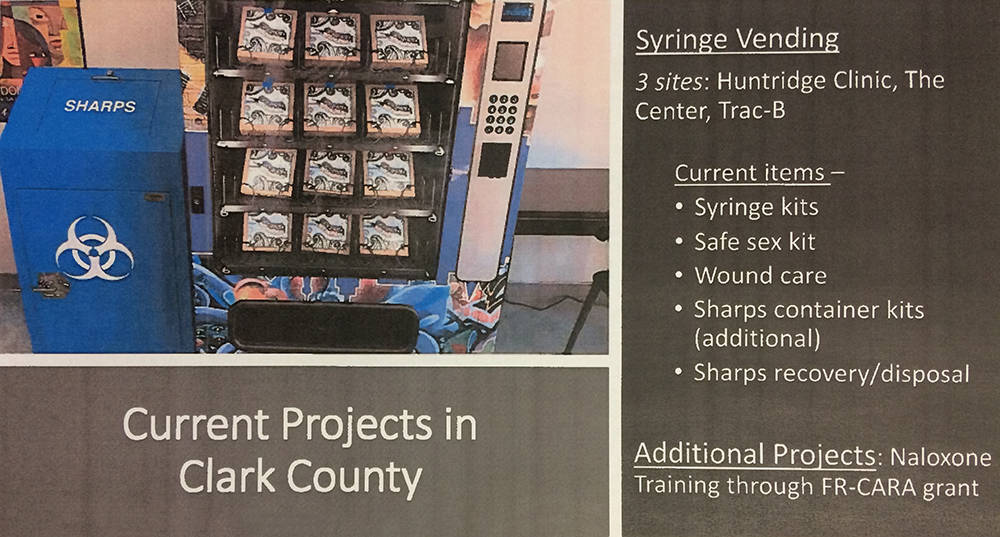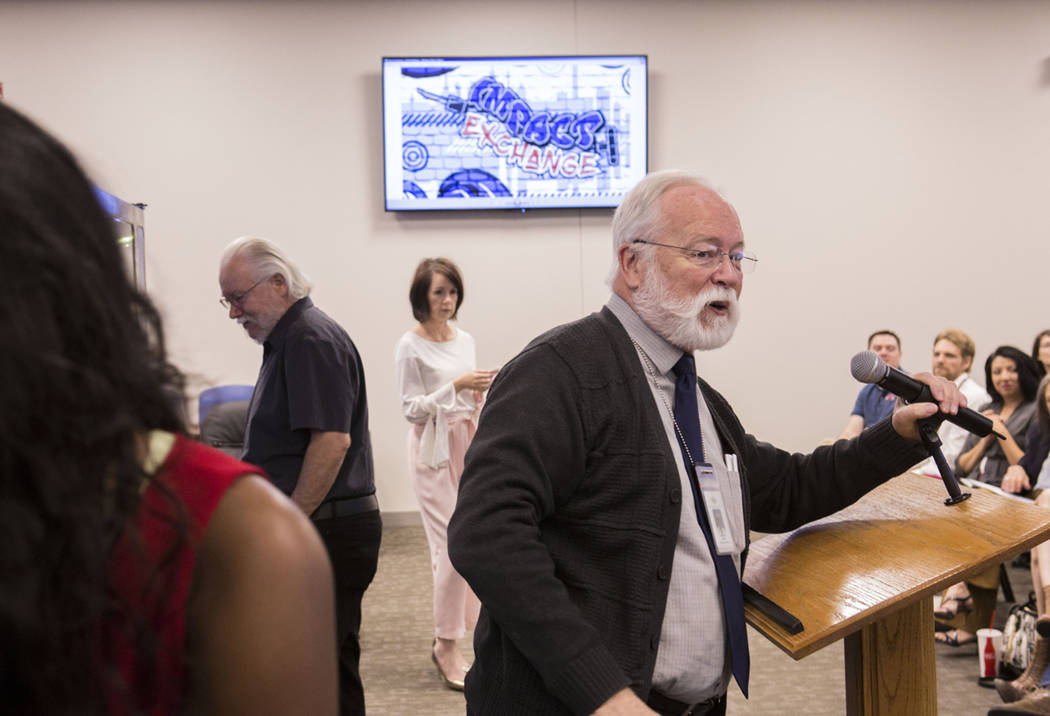Syringe vending machine set for Tonopah
The Southern Nevada Health District has started a unique effort in Clark County, with a “syringe vending machine” initiative underway and the health district is now looking to expand into rural areas as well.
The syringe vending machines come stocked with supplies that are intended to be utilized by those who take illicit drugs by injection.
Included are products such as sterile syringes, safe sex kits and wound care items and there is even a sharps deposit box attached, all in the name of preventing the spread of bloodborne illnesses.
With Tonopah located right on the border of Esmeralda County, which has been assessed by the U.S. Centers for Disease Control and Prevention as vulnerable to an HIV or hepatitis C outbreak among injection drug users, the district is now planning to have one of these vending machines placed in that location.
During the Nye County Commission’s Feb. 5 meeting Southern Nevada Health District Chief Health Officer Dr. Joseph Iser traveled to Tonopah to present the board with an overview of the project and seek its support in moving forward.
Iser explained that the effort had seen successful results thus far, with three vending machines in Las Vegas, one at the Center, another at Trac-B and the third at Huntridge Clinic.
These locations are managed with help from community partners and the same would be the case in Nye County. Iser said a community partner has already been identified for the expansion, with the NyE Communities Coalition to work alongside the health district. This was one reason that Tonopah was selected, Iser said.
He noted that in the health district’s view, Goldfield, which is not far from Tonopah but is actually located in Esmeralda County, simply did not make sense for its purposes.
“We have found these vending machines to be very useful in Clark County,” Iser said, continuing, “When we first started this project, the CDC… was excited about this as a first-time thing in the United States and they have looked at the data that we have received and find it to be helpful.”
The move into Nye County would be the first expansion outside of Clark County, Iser said. “It’s time that we really expand out to rural Nevada so that we can help to prevent, especially, the infectious disease of HIV or other bloodborne diseases that can be transmitted by reusing used needles,” he detailed.
Concerns about the accessibility of the machines were raised but Iser said the machines were secure and safe. Those who wish to use the vending machines must register first and they receive a number code which they can punch into the machines to access items, free of cost. This prevents access by children, which is a specific worry for many, Iser stated.
In addition, the sharps deposit boxes help provide an extra layer of protection for children, as it also prevents used needles from being left lying around where they could easily be picked up by others.
Reservations were expressed about the possibility that such a program would “enable” drug users as well but Iser assured the commission that this was not the case.
“A lot of people think that, for example, if you provide sex education in school, you are encouraging young women and men to have sex… and that if you do needle exchange, syringe exchange, that you encourage the activity and all of the studies show that it does not,” he informed.
Iser said those who use IV drugs were going to inject them anyway, regardless of whether they have clean needles to use. However, when giving the chance to obtain sterile syringes, many will do so and at the same time, they are exposed to educational materials and resource information that could help them kick their habit.
Iser came prepared with a letter of support for the commission’s consideration and after the discussion, the motion to approve passed with all in favor.
“Injection drug use is a leading cause of the spread of bloodborne pathogens, including HIV, hepatitis B and hepatitis C,” the letter of support read. “For more than a decade, federal reports from agencies such as the Centers for Disease Control and Prevention (CDC), the Institute of Medicine and the National Institutes of Health have lauded the use of syringe exchange programs for HIV prevention.
“The CDC has also reported that syringe exchange programs not only serve as an effective HIV prevention strategy, but they also provide access for people who inject drugs to treatment services, HIV and hepatitis C testing, harm reduction equipment, needle disposal program and referrals,” the letter continued. “Syringe exchange programs in the format of SVMs (syringe vending machines) reduce the risk of bloodborne pathogens and do not encourage illicit drug use. The proposed SVM for Tonopah would be accessed by rural people with few other health care options.”
Contact reporter Robin Hebrock at rhebrock@pvtimes.com


















